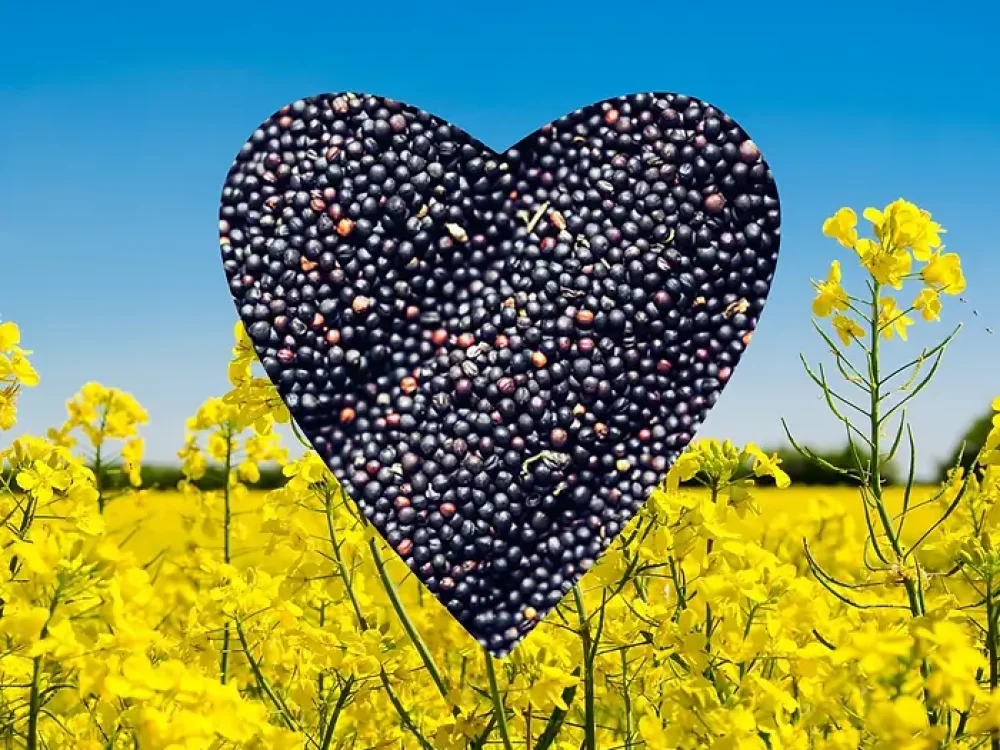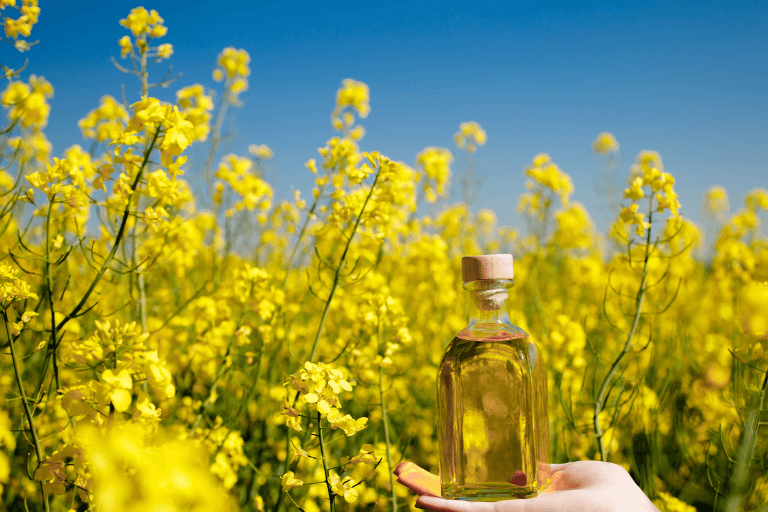Both extra-virgin olive oil and cold pressed rapeseed oil are healthy oils to have in your kitchen. Olive oil is often promoted as a healthy oil. However, I wanted to write this post to highlight that cold-pressed rapeseed oil is also a great choice of oil in terms of its nutritional properties, uses and for consumers in the UK, it has fewer food miles to get to your table.
What is rapeseed?
Rapeseed or oilseed rape comes from the same brassica family as broccoli, cabbage and cauliflower. Originally from the Mediterranean and Northern Europe, rapeseed crops have been grown in areas across the world for around 4,000 years. However, it was not grown in Europe on a commercial scale until the thirteenth century when it was originally used mainly for lamp oil and soaps.
The first crops of oilseed rape were introduced to Scotland in 1983. The pioneering crop was grown on a farm in north-east Aberdeenshire, which proved that oilseed rape could be successfully grown and produce good yields in Scotland. In fact, the long day length and cool temperatures means that the crop is very well suited to the environment in Scotland. When harvested, the rapeseeds are small black spheres around 2mm in diameter.
Rapeseed or Canola oil?
In the UK we refer to it as rapeseed oil, but in North American its canola oil. This is because some clever Canadian scientists were able to improve the quality and reduce the uric acid in the oil of rapeseed crops through traditional plant cross-breeding.
The early varieties of rapeseed oil contained high levels of uric acid which is thought to have detrimental effects on human health. In 1976, canola oil (a word derived from ‘Canada’ and ‘ola’, meaning ‘oil’) was registered. The following year, the low-uric acid rapeseed oil was introduced as an edible oil in Europe (Lin Lin, 2013).
Canola oil (or ‘rapeseed oil’ as it is known as in the UK) is the third most consumed vegetable oil worldwide after palm and soybean oil (Shahbandeh 2023).
Rapeseed oil or Cold-pressed rapeseed oil?
In the UK, when you buy a bottle of vegetable oil, it’s likely to be rapeseed oil (you can check the ingredients list to see). The oil is extracted from the rapeseed using heat and a chemical solvent such as hexane. Using heat and hexane helps extract the maximum amount of oil from the rapeseed. During processing the solvent (hexane) mix evaporates completely, so that there is no residual hexane in the final extracted oil. To read more about the processing of rapeseed oil see this article by Dr Guy Crosby, School of Public Health, Harvard.
With cold-pressed rapeseed oil, the seeds are gently pressed at less than 40˚C, ensuring that the full nutritional value of the oil is retained. Once pressed, the oil is filtered to ensure particles are removed before being bottled and labelled.
Nutrition and health properties
Cold pressed rapeseed oil has the lowest proportion of saturated fats of all vegetable oils. It has substantial amounts of monounsaturated fatty acids, and because of this, it has a high smoke point, so it can be heated to a high temperature without spoiling its antioxidants, character, colour or flavour.
It’s rich in the beneficial omega-3 fatty acids which help maintain normal blood cholesterol concentrations. It also contains polyunsaturated fatty acids including omegas 3, 6 and 9, which support brain, heart and joint function.
The oil is a source of vitamin E which protects cells from damage and cold-pressed rapeseed contains a variety of antioxidants with numerous health benefits.
But, I’ve heard on social media that seed oils are bad
I’ve noticed recently messages on social media saying that seed oils like rapeseed oil are linked to inflammation and cardiovascular disease and therefore should be avoided. However, the science does not support this.
Dietary trials have shown improvements in cardiovascular health when saturated fats in the diet are replaced with polyunsaturated fats, like those found in seed oils (Sacks et al, 2017). Also, a meta-analysis of 54 controlled studied concluded that all types of vegetable oil are more effective at reducing LDL (bad) cholesterol when compared to butter (Schwingshackl at al, 2018).
Messages around seed oils being pro-inflammatory seem to stem from the high omega-6 polyunsaturated fatty acids found in seed oils. However, a review of 15 randomised controlled trials found virtually no evidence that omega-6 fatty acids increases the concentration of inflammatory markers (Johnson and Fritsche 2012).
To read more about what the science says on seed oils check out this article ‘Are seed oils bad for you? on the Zoe website.
How to use the oil
Although we need some fat in our diet, use oils in moderation as they are very energy-dense. Cold-pressed rapeseed oil is ideal for roasting and frying as it has a high smoke point. It can also be used in baking, often to help improve the fatty acid profile, as rapeseed oil (high in unsaturated fatty acids) can be used in place of butter or lard (high in saturated fatty acids). It’s also great to drizzle on a salad. Because of its versatility, flavour and colour, it’s a popular choice of many chefs.
The taste is often described as “a subtle nutty and buttery flavour with earthy notes.” Look out for infused oils too. I spoke with Lynn Mann recently on the Food Connections podcast, who, along with her husband Chris, produces a variety of cold-pressed rapeseed oil infusions. Lynn gave lots of suggestions on how to use the oil to enhance the flavour and tastiness of various dishes.





